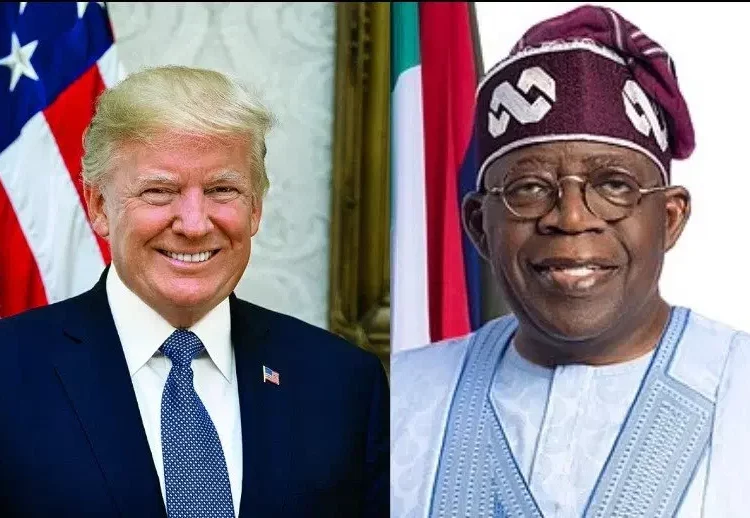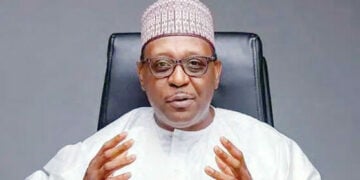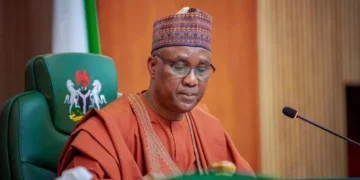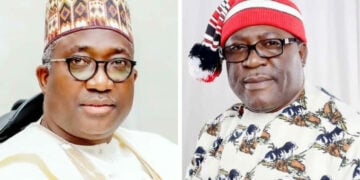The President of the United States of America, Donald Trump, threatened on Saturday night to attack Nigeria if the killings of Christians continued.
This threat follows his earlier warning on Friday, urging the Nigerian government to take decisive action against terrorists attacking and killing Nigerians in the country.
Trump stated that his country would immediately stop all aid and assistance to Nigeria, which he described as a disgraced country.
He said, “If the Nigerian government continues to allow the killings of Christians, the USA will immediately stop all aid and assistance to Nigeria, and may very well go into that now disgraced country, ‘guns-a-blazing’, to completely wipe out Islamic terrorists who are committing these horrible atrocities.
“I am hereby instructing our Department of War to prepare for possible action. If we attack, it will be fast, vicious, and sweet, just like the terrorist thugs attack our cherished Christians! Warning: The Nigerian government had better move fast!”
Earlier on Saturday, President Bola Tinubu had faulted the redesignation of Nigeria by Trump as a “Country of Particular Concern” over alleged Christian persecution, insisting that religious liberty remains a core feature of Nigeria’s democracy.
In a statement personally signed by him, President Tinubu said the United States’ characterisation of Nigeria as religiously intolerant does not reflect the country’s reality or the government’s ongoing efforts to protect citizens of all faiths.
“Nigeria stands firmly as a democracy governed by constitutional guarantees of religious liberty.
“Since 2023, our administration has maintained an open and active engagement with Christian and Muslim leaders alike, and continues to address security challenges which affect citizens across faiths and regions,” the president declared.
Trump had on Friday night announced via his Truth Social platform that Nigeria was being redesignated due to alleged genocide against Christians, claiming the U.S. could not ignore “mass killings by radical Islamists.”
However, President Tinubu, in his reaction, said such claims failed to acknowledge Nigeria’s diversity and commitment to peaceful coexistence among its citizens.
“The characterisation of Nigeria as religiously intolerant does not reflect our national reality, nor does it take into consideration the consistent and sincere efforts of the government to safeguard freedom of religion and beliefs for all Nigerians,” he said.
Insisting that religious freedom and tolerance “have been a core tenet of our collective identity and shall always remain so,” Tinubu stressed that Nigeria “opposes religious persecution and does not encourage it.”
Tinubu, however, said Nigeria would continue to work with the U.S. government and other international partners to promote understanding and cooperation on protecting communities of all faiths.
“Nigeria is a country with constitutional guarantees to protect citizens of all faiths,” he reiterated. “Our administration is committed to working with the United States government and the international community to deepen understanding and cooperation on the protection of communities of all faiths.”
Also, the special adviser to President Tinubu on information and strategy, Bayo Onanuga, dismissed reports suggesting that thousands of Christians are being slaughtered in Nigeria.
He described such claims as a gross exaggeration.
Onanuga made this comment on Saturday while reacting to a post by United States’ Secretary of State, Marco Rubio, who alleged that radical Islamists and Fulani militias were responsible for the “ongoing slaughter of thousands of Christians” in Nigeria.
Rubio said on X on Friday, “The ongoing slaughter of thousands of Christians in Nigeria by radical Islamists and Fulani ethnic militias is both tragic and unacceptable. As @POTUS said, the United States stands ready, willing, and able to act.”
Rubio’s comment followed the White House’s announcement designating Nigeria as a Country of Particular Concern over alleged religious freedom violations.
Responding to Rubio via his official X handle, Onanuga wrote, “Dear Secretary Rubio, there is no ongoing slaughter of thousands of Christians in Nigeria. This is a gross exaggeration of the Nigerian situation. What we do have are sporadic attacks on some villages by bandits and terrorists, and the attacks are religiously insensitive. Christians, Muslims, churches, and mosques are attacked randomly.”
Onanuga asserted that insecurity in Nigeria is not driven by religion, but that both faith communities have suffered from violent attacks across the country.
“What our country requires from America is military support to fight these violent extremists in some states of our country, not designation as a nation of particular concern,” Onanuga added.
In another reply to Rubio, Onanuga said: “Secretary Rubio, Muslim lives matter too.”
Nigeria May Face Severe US Sanctions Over Classification – Experts
Meanwhile, Nigeria may face severe sanctions and other forms of restrictions following Friday’s re-designation of the country as a Country of Particular Concern (CPC) by US President Donald Trump in response to the persisting allegations of Christian genocide in the country, experts have warned.
Although the authorities in Nigeria have vehemently denied the claims, stating that the violence in the country is a result of insurgency and banditry, not religious persecution, and that it affects both Muslims and Christians, the Trump administration insists Christians are being massacred and that this has to stop.
The Nigerian government, through the Ministry of Foreign Affairs, also issued a statement on Saturday rejecting the re-designation and stressing that the country is committed to ending terrorism and violent extremism.
The Ministry of Foreign Affairs’ spokesman, Kimiebi Ibienfa, said in the statement that the government had noted the recent statement by the United States of America on religious freedom in Nigeria.
The statement said, “We remain committed in our resolve to tackle the violent extremism that is fuelled by special interests who have helped drive such decay and division in countries across the intersecting West African and Sahel regions.
“We mourn all the victims of violent extremism and salute our armed forces as they continue to fight against vicious but cowardly foes. The Federal Government of Nigeria will continue to defend all citizens, irrespective of race, creed, or religion.
“Like America, Nigeria has no option but to celebrate the diversity that is our greatest strength. Nigeria is a God-fearing country where we respect faith, tolerance, diversity and inclusion, in concurrence with the rules-based international order.”
The statement noted that the US had been and – will always remain – a close ally of Nigeria because the “Federal Republic of Nigeria, and the Government of President Bola Ahmed Tinubu will maintain our laser focus and steadfast commitment to all partners who believe in genuine peace, stability, freedom and democracy.”
However, the Nigerian public and international affairs analysts have pointed to the implications of the U.S. action and urged the federal government to take appropriate measures to resolve the matter.
Speaking to LEADERSHIP Sunday, former Nigerian High Commissioner to Singapore, Ambassador Ogbole Ode, warned that “Nigeria risks losing foreign investors as they might think twice before coming to Nigeria, especially in this period of economic crisis in the country.”
He also warned that Nigeria could be isolated from international engagements and could be subjected to undue restrictions by U.S. and her allies, adding that if the country does not tackle the problem head on, it might create an uncomfortable situation where some unfriendly foreign powers may latch on the issue to deepen the cleavages in the country to destabilise the country.
The former envoy expressed dismay that it took a foreign country’s alarm for Nigeria to be jolted to its current realities of unspeakable violence that have gone unabated for decades now.
He advised the government to decisively deal with the issue of terrorism to avert such foreign interference.
Also speaking on the issue, a retired Nigerian diplomat and cyber security expert, Prof Uche M. Mbanaso, said that “Nigeria has failed to manage its crisis” as perpetrators of killing now move with impunity, sacking communities in Benue, Plateau, Zamfara and other states amid glaring “government helplessness.”
He lamented that the government was now negotiating with gun-wielding bandits and terrorists even as he frowned at the lack of political will on the part of the Nigerian government to tackle the killings.
Mbanaso noted that although the killings are across the religious divide, more Christian communities have suffered more from the killers who are perpetrating the killings to grab land using religion as cover.
He warned that the consequences of the Trump decision could trigger economic, political and security problems for Nigerians and may stop investment from coming into the country.
He added that the US has considerable influence on its allies around the world, which might do its bidding to impose varying degrees of sanctions and restrictions on Nigeria and Nigerians.
He challenged President Tinubu to rise to the occasion and crush the terrorists once and for all.
On his part, international affairs analyst, Dr. Austin Maho, warned that the designation of Nigeria as a “Country of Particular Concern” by the Donald Trump administration had significant negative diplomatic and economic implications for the country.
He said, “Diplomatically, Nigeria may face increased scrutiny which may manifest in terms of visa restriction to the US and other western countries on government officials and other political appointees.
‘‘Nigerian human rights record may also come under increased scrutiny over its failure to curtail religious violence and terrorism in the country over the years which has led to violent destruction of lives and properties and accusation of genocide against its Christian population especially in the northern parts of the country.”
He added that economically, Nigeria may face economic isolation or outright sanctions by the United States and its allies.
“Furthermore, Nigeria’s strategic partnership with the US may be impacted, further straining US/ Nigeria cooperation on counter-terrorism measures, especially in military equipment procurement, military aid and intelligence sharing,” he said.
“Be that as it may, the government should know that the designation of Nigeria as a country of particular concern by the US is designed to force the government to act and take concrete and verifiable measures to address the situation. Government is a continuum; to say that the situation predates the current administration is to deny responsibility. The administration should accept responsibility and roll out an action plan to address the situation.
“The fact remains that the US may have its script which may not be in our national interest; however, we must accept that this is our own domestic internal problem, which we must muster the courage and resources to put an end to without waiting for external powers to tell us what to do,” he added.
Nigeria was first designated as a CPC in December 2020 by the Trump administration but was removed the following year by the Biden administration in November 2021. This decision triggered controversy and was heavily criticised by the U.S. Commission on International Religious Freedom (USCIRF) and some members of the U.S. Congress.
However, in 2025, a bill was introduced in the U.S. Senate (the “Nigeria Religious Freedom Accountability Act of 2025”) and a House subcommittee held a hearing recommending that Nigeria be reinstated as a CPC due to continued violence against religious communities and the government’s perceived failure to address it.
The pressure from some U.S. lawmakers and human rights organisations for Nigeria to be put back on the list became intense in recent weeks, following incessant attacks.
CPC is a designation by the United States Secretary of State (under authority delegated by the President) of a country responsible for particularly severe violations of religious freedom under the International Religious Freedom Act (IRFA) of 1998 (H.R. 2431) and its amendment of 1999 (Public Law 106-55).
A CPC is a country that shows clear and consistent patterns of religious intolerance, discrimination, or persecution.
Some of the countries that have been so designated since 2023 include Burma, China, Cuba, Eritrea, Iran, the Democratic People’s Republic of Korea, Nicaragua, Pakistan, Russia, Saudi Arabia, Tajikistan, and Turkmenistan.





